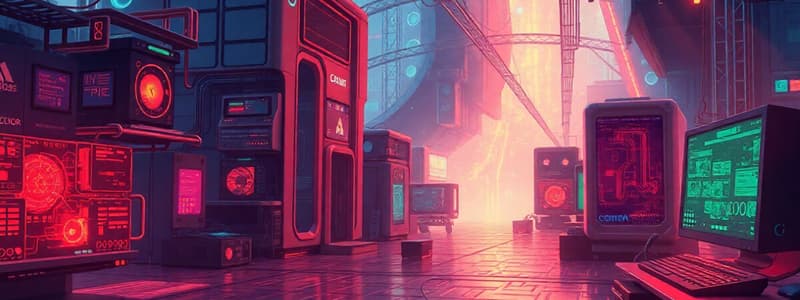Podcast
Questions and Answers
Which of the following is NOT a generation of computers?
Which of the following is NOT a generation of computers?
- Third Generation
- First Generation
- Second Generation
- Binary Generation (correct)
What is a computer primarily used for?
What is a computer primarily used for?
perform arithmetic and logical operations
Computers can be classified according to ______.
Computers can be classified according to ______.
type, size, purpose
What does the term 'computer' derive from?
What does the term 'computer' derive from?
What type of computer performs calculations using digits?
What type of computer performs calculations using digits?
A supercomputer is the least powerful type of computer.
A supercomputer is the least powerful type of computer.
What type of computer uses continuous physical phenomena?
What type of computer uses continuous physical phenomena?
Match the following computer classifications with their definitions:
Match the following computer classifications with their definitions:
Which of these is a type of specialized computer?
Which of these is a type of specialized computer?
What is the primary function of system software?
What is the primary function of system software?
Flashcards are hidden until you start studying
Study Notes
Computer Generations
- There are five computer generations: First, Second, Third, Fourth, and Fifth.
- Each generation is characterized by advancements in technology and processing power.
Functions of a Computer
- Computing, processing, and storing data.
- Performing tasks as directed by software programs.
- Facilitating communication, entertainment, and research.
Classifying Computers
- Classification based on size, purpose, and processing power.
- Categories include: Personal computers (PCs), mainframes, supercomputers, and embedded systems.
Origin of the Term "Computer"
- "Computer" derives from the Latin word "computare," meaning "to calculate."
Digital Computers
- Digital computers utilize digits (0 and 1) for calculations and data processing.
- They form the basis of modern computing.
Analog Computers
- Analog computers use continuous physical quantities, like voltage or current, to represent data.
- They provide a way to solve problems through continuous physical phenomena.
Categories of Computers
- Mainframe: Large, powerful computers designed for high-volume data processing and resource sharing.
- Supercomputer: Extremely powerful computers designed for complex calculations, simulations, and scientific research.
- Personal Computer (PC): General-purpose computers designed for individual use in homes, offices, and schools.
- Embedded Systems: Specialized computers integrated into devices and appliances to perform specific tasks.
Supercomputers
- Supercomputers are known for their immense processing power.
- They are not the least powerful, rather they are the most powerful.
Specialized Computers
- Embedded Systems: are specialized computers.
- Supercomputers: are a specialized computer designed to perform complex scientific and engineering calculations.
System Software Functions
- System software is designed to manage the hardware and internal processes of a computer system.
- It includes operating systems, device drivers, utilities, and firmware.
- Provides a platform for application software to run effectively.
Studying That Suits You
Use AI to generate personalized quizzes and flashcards to suit your learning preferences.




